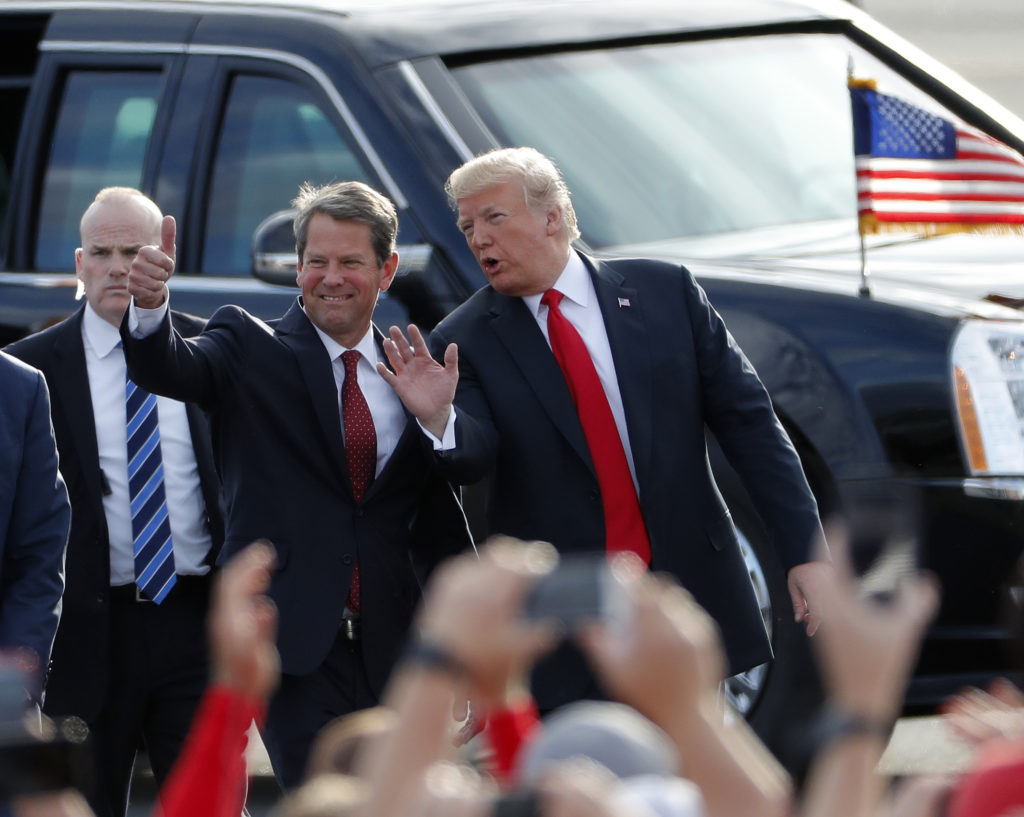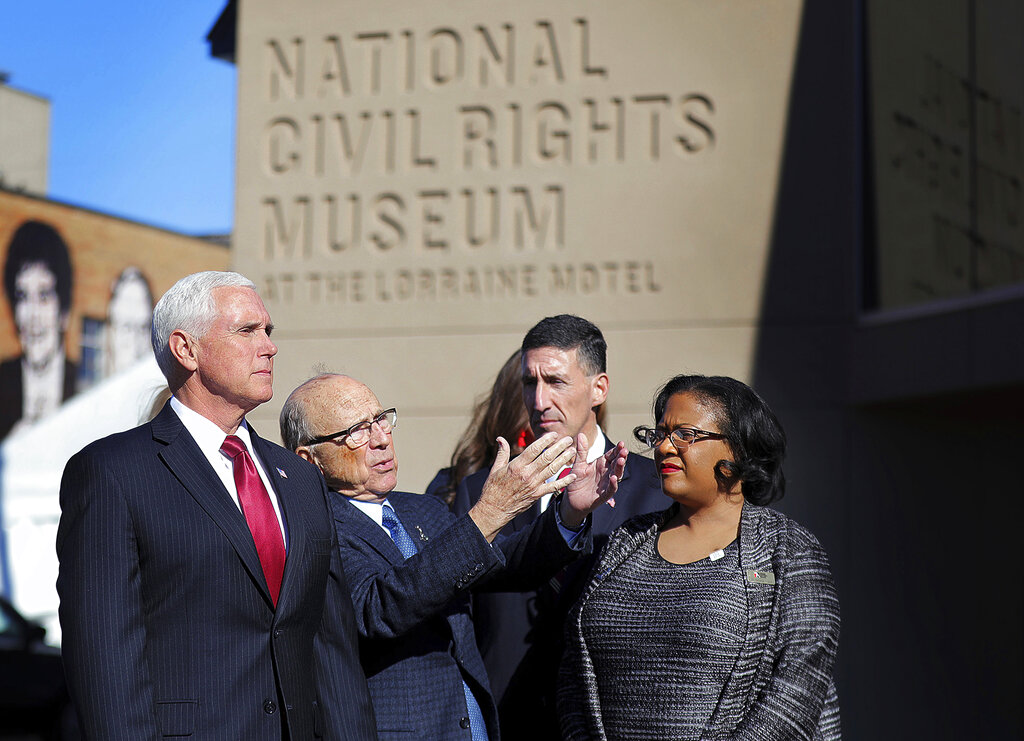Donald Trump headed to Georgia as turnout driver, but also a threat

Some establishment Republicans are sounding alarms that President Donald Trump’s conspiratorial denials of his own defeat could threaten the party’s ability to win a Senate majority and counter President-elect Joe Biden’s administration. The concerns come ahead of Trump’s planned Saturday visit to Georgia to campaign alongside Sens. David Perdue and Kelly Loeffler, who face strong Democratic challengers in Jan. 5 runoffs that will determine which party controls the Senate at the outset of Biden’s presidency. Republicans acknowledge Trump as the GOP’s biggest turnout driver, including in Georgia, where Biden won by fewer than 13,000 votes out of about 5 million cast. That means every bit of enthusiasm from one of Trump’s signature rallies could matter. But some Republicans worry Trump will use the platform to amplify his baseless allegations of widespread voter fraud — arguments roundly rejected in state and federal courts across the country. That could make it harder for Perdue and Loeffler to keep a clear focus on the stakes in January and could even discourage Republicans from voting. “The president has basically taken hostage this race,” said Brendan Buck, once a top adviser to former House Speaker Paul Ryan. Especially fraught are Trump’s continued attacks on Georgia’s Republican state officials and the state’s election system, potentially taking away from his public praise of Loeffler and Perdue. “Trump’s comments are damaging the Republican brand,” argued Republican donor Dan Eberhart, who added that the president is “acting in bad sportsmanship and bad faith” instead of emphasizing Republicans’ need to maintain Senate control. The GOP needs one more seat for a majority. Democrats need Jon Ossoff to defeat Perdue and Raphael Warnock to defeat Loeffler to force a 50-50 Senate, positioning Vice President-elect Kamala Harris as the tie-breaking majority vote. Trump on Monday blasted Gov. Brian Kemp as “hapless” for not intervening to “overrule” Secretary of State Brad Raffensperger’s certification of Biden’s win. A day earlier, Trump told Fox News he was “ashamed” he’d endorsed Kemp in his 2018 GOP primary for governor. Kemp’s office noted in response that state law gives Kemp no authority to overturn election results, despite Trump’s contention that Kemp could “easily” invoke “emergency powers.” Meanwhile, Raffensperger, a Trump supporter like Kemp, has accused the president of throwing him “under the bus” for doing his job. Perdue and Loeffler have attempted to stay above the fray. They’ve long aligned themselves with Trump and even echoed some of his general criticisms of the fall elections, jointly demanding Raffensperger’s resignation. But the crux of their runoff argument — that Republicans must prevent Democrats from controlling Capitol Hill and the White House — is itself a tacit admission that Biden, not Trump, will be inaugurated Jan. 20. And at one recent campaign stop, Perdue heard from vocal Trump supporters who demanded that he do more to help Trump somehow claim Georgia’s 16 electoral votes. Republicans see three potential negative outcomes to Trump fanning the flames. Some GOP voters could be dissuaded from voting again if they accept Trump’s claims that the system is hopelessly corrupted. Among Republicans more loyal to Trump than to the party, some could skip the runoff altogether out of anger at a party establishment the president continues to assail. Lastly, at the other end of the GOP spectrum are the moderate Republicans who already crossed over to help Biden win Georgia and could be further alienated if the runoff becomes another referendum on Trump. Josh Holmes, a top adviser to Senate Majority Leader Mitch McConnell, said Republicans “haven’t seen any evidence of lack of enthusiasm in the Senate races.” But none of those potential bad effects would have to be sweeping to tilt the runoffs if they end up as close as the presidential contest in Georgia. “We’ll see how it plays out. It changes day by day and week by week. But so far, so good,” Holmes said. In Georgia, any Republican concerns are more circumspect. Brian Robinson, a former adviser to Kemp’s Republican predecessor as governor, said Trump should “drive a strong, forward-looking message” about what’s at stake for a Republican base that “is fervently devoted to him.” “The best thing he can do for the party,” Robinson said, “is to talk about the importance of having a Republican Senate majority to project his policy legacy and to make sure the Democrats can’t reverse a lot of what he has put in place that Republicans support.” Asked what Trump should avoid, Robinson circled back to what he believes the president should say. Former U.S. Rep. Jack Kingston, a Trump ally, downplayed the potential for GOP splintering, framing an “inner-family squabble” as a sideshow to the “incredible” consequences that define the runoffs. “Followers of Trump will follow Trump, but they’re not blind to the huge stakes. And neither is he,” Kingston said. “He knows to keep his legacy. He’s got to get these people reelected.” Trump, Kingston argued, is “keeping the base interested,” a necessary component of any successful runoff campaign since second rounds of elections often see a drop-off in voter participation. Robinson added that Democrats face their own challenge in replicating record turnout for Biden. “What’s the best motivator? Fear,” he said. Before November, Democrats dreaded a second Trump term more than Republicans feared Trump losing, Robinson reasoned. “Republicans have reason to be scared now,” he said, because of the prospect that Democrats could control both ends of Pennsylvania Avenue. “That could make a difference in turnout” beyond anything Trump says, Robinson concluded. For their part, the senators continue their public embrace of all things Trump ahead of the visit. “I couldn’t be more excited to welcome” the president “back to Georgia,” Loeffler wrote on Twitter after Trump confirmed his plans. Perdue’s campaign quickly retweeted the comment, which Loeffler punctuated with a reminder that the runoffs are “an all-hands-on-deck moment.” It’s not clear, though, if all Republicans will be on hand at all. Kemp, the governor who appointed Loeffler upon Sen. Johnny Isakson’s retirement last year, has on previous Trump visits
Donald Trump ‘ashamed’ to have endorsed Republican Georgia governor

President Donald Trump said Sunday he was “ashamed” for endorsing the Republican governor of Georgia after he lost in the state to Democrat Joe Biden. Trump has seethed over losing the southern state, which hadn’t voted for a Democrat for president in nearly 30 years. In January, the state will decide whether the GOP retains control of the U.S. Senate when voters decide two run-off Senate races. Trump said on Fox News that Gov. Brian Kemp has “done absolutely nothing” to question the state’s results. Trump has made baseless accusations that illegal votes cost him the election in Georgia and beyond. His legal challenges have failed in several states. Trump backed Kemp’s campaign in 2018, boasting that his “full endorsement” helped him edge rising Democrat Stacey Abrams. In this month’s presidential contest, Biden beat Trump by about 12,670 votes. Democrats hope for two other upset victories in twin Senate races on Jan. 5 against Republican office holders. That would deny Republicans their majority, keeping the GOP with 50 seats, while Vice President-elect Kamala Harris would be available for tie-breaking votes. Democrat Jon Ossoff is challenging Sen. David Perdue while Rev. Raphael Warnock takes on Sen. Kelly Loeffler. No candidate won at least 50% of the vote share in this month’s election, leading to the head-to-head runoffs. Ossoff said Sunday that a Republican-controlled Senate will hit the Biden administration with the same “obstructionism” it mounted against former President Barack Obama. “It will be paralysis, partisan trench warfare,” he told CNN. “At a moment of crisis, when we need strong action.” Loeffler on Fox News said GOP victories would be a “firewall to socialism” and the Democratic policies of Senate Minority Leader Chuck Schumer. It is Loeffler’s first election cycle after Gov. Kemp appointed her to the seat in January when her predecessor resigned. Trump on Saturday plans to arrive in the state he lost to campaign for the GOP incumbents. “We’re making sure that Georgians are fired up to turn out to vote,” Loeffler said. “If we vote, we will win this election.” Republished with the permission of the Associated Press.
Republicans reprise warnings of leftism in Georgia races

Socialists. Radical extremists. Marxists. Those over-the-top caricatures of Democrats make up Republicans’ opening arguments as they try to protect Georgia’s two U.S. senators who face strong challenges in Jan. 5 runoffs that’ll determine which party controls the chamber at the start of President-elect Joe Biden’s Democratic administration. Florida Sen. Marco Rubio led the charge Wednesday, campaigning in suburban Atlanta alongside Sen. Kelly Loeffler and warning that defeats for her and fellow Georgia Sen. David Perdue would hand over the U.S. government to “radical elements.” Loeffler went so far as to assert, without supporting details, that her Democratic challenger Raphael Warnock has “a Marxist ideology.” Loeffler took no questions after the event that filled the Cobb County Republican Party headquarters with hundreds of enthusiastic voters, many of them not wearing masks as coronavirus cases spike across the country. Warnock’s campaign pushed back, noting the Democrat’s policy preferences fall squarely within the U.S. political mainstream. Terrence Clark, a Warnock aide, said Loeffler is trying to “scare Georgians” while “misrepresenting” Warnock’s candidacy and obscuring her own record. It’s a familiar trope for Republicans to blast Democrats, especially in traditionally GOP-leaning states, as “too liberal” or even “socialist.” But the vehemence to open a two-month runoff blitz underscores the national stakes of Georgia’s unusual twin Senate contests and the sharp focus Republicans are putting on energizing core supporters for a second round of voting. The arguments come as Loeffler, Perdue, and other Georgia Republicans continue suggesting the Nov. 3 election — overseen by a Republican secretary of state — was rife with voting irregularities and tabulation errors, assertions made without evidence but that animate a GOP base still loyal to President Donald Trump even after his national defeat. “Turnout takes care of itself when the presidential race is on the ballot, so it can still boil down to persuasion in the middle,” said Republican consultant Chip Lake, a top adviser on Rep. Doug Collins’ unsuccessful bid against Loeffler. “In a runoff, it’s no longer about persuasion” Lake continued. “It’s about the bases.” Collins, now leading Trump’s recount efforts in Georgia, said the goal is to keep Republicans “fired up because they don’t want to see our country turn to a liberal perspective.” Republicans and Democrats are bracing for an unprecedented national-scale campaign in Georgia, a newfound two-party battleground where record turnout of roughly 5 million split almost evenly. Biden leads Trump by about 14,000 votes, but Secretary of State Brad Raffensperger announced plans Wednesday for an audit with a hand tally of ballots before certifying the results. Perdue, a staunch Trump ally first elected in 2014, led Democrat Jon Ossoff but fell short of the majority Georgia law requires for victory. Loeffler, appointed after Republican Sen. Johnny Isakson announced his retirement last year, trailed Warnock in an all-party primary to finish out the final two years of a six-year term. The Associated Press has called runoffs in both contests but hasn’t called Georgia’s 16 presidential electoral votes. Nationally, Republicans have secured 50 Senate seats to Democrats’ 48. Still, the GOP needs at least one of the Georgia seats to command a majority in January. In a 50-50 Senate, Democrats would have the tie-breaking vote in Vice President-elect Kamala Harris. Rubio and Loeffler warned of dire consequences, even as Rubio implicitly conceded the hyperbole. “To be fair, not all Democrats are socialists,” Rubio said. “But all socialists are Democrats.” Rubio alluded to failed presidential candidate Bernie Sanders, an independent who calls himself a democratic socialist and caucuses with Senate Democrats. Rubio nodded to progressive calls to “defund the police” and Democrats who support policies like “Medicare for All” single-payer health insurance or tuition-free public college nationwide. “All the energy” and “all the money” in the Democratic Party, Rubio insisted, come from such forces. Rubio didn’t mention Biden, who won the nomination and presidency as an establishment figure promising bipartisanship and compromise. Biden often noted as he campaigned that he defeated Sanders and other more liberal candidates for the nomination. “He thinks he’s running against someone else,” Biden quipped at Trump during an Oct. 22 debate when the president sought to label his challenger a socialist. Biden, for example, supports adding a “public option” government health care plan to existing insurance markets, but without ending private insurance. He backs significant public spending on green energy but opposes progressives’ push for quickly phasing out fossil fuels. Warnock and Ossoff have largely aligned behind Biden’s agenda, especially on a public option. Clark, Warnock’s spokesman, noted that Loeffler backs GOP efforts to roll back the 2010 Affordable Care Act that bars insurers from discriminating against customers based on their health history. He also saddled her with the GOP-run Senate’s failure to pass another coronavirus economic aid package as millions of Americans face the loss of jobless benefits, foreclosures, and evictions. Republicans nonetheless are doubling down after GOP Senate incumbents defeated well-financed challengers in more conservative states such as Iowa, Texas, and Montana, while Republican challengers knocked off several House Democrats who’d won moderate districts in 2018. Their bet is that Georgia, long a GOP stronghold before Biden’s performance in the presidential race, follows the same path. Republished with the permission of the Associated Press.
Sen. Richard Burr steps aside as Senate intelligence chair amid FBI probe

His decision to leave the chairman position surprised fellow committee members.
Martin Luther King Jr. Day: Faith, politics mix on holiday

The Martin Luther King Jr. holiday found leaders still wrestling over how to best embody the slain civil rights leader.


